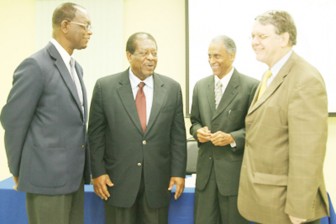(Trinidad Guardian) Trinidad and Tobago is bound by international law to make the Caribbean Court of Justice (CCJ) its final court of appeal. These were the words of President of the CCJ Sir Dennis Byron, on Tuesday while addressing a media breakfast meeting at the CCJ’s Henry Street, Port-of-Spain, headquarters.

Byron said: “It would not cost more money to accede to having the CCJ as the final appellate court. Countries who have not acceded as yet are not benefiting as fully as they could.” An optimistic Justice Dennis noted, however, that the judges of the CCJ were sure that several other Caricom members would accede in the near future.
Under international law, treaties between countries are upheld through goodwill between them, he said. Of the 12 Caricom nations who initially signed the agreement establishing the court in 2001, only three have acceded to make it their final appellate court. They are Barbados, Guyana and, most recently, Belize.
The court was later inaugurated in 2005 with seven presiding judges, with former Chief Justice Michael de la Bastide being appointed its first president. Sir Dennis also said that Privy Council judges, who at present adjudicate on appeals for the other nine nations, have expressed the view that Caricom nations should instead use the CCJ.
“The CCJ seeks to improve, build upon and develop Caribbean jurisprudence,” Byron said. He further stated that for complete independence, the members states would need to “completely manage their jurisprudence.” CCJ judge Rolston Nelson, who also spoke at the event yesterday, expressed similar sentiments as Justice Byron.
Nelson, a Trinidadian, suggested that the delay in acceding to the CCJ may be political. “There is a parliamentary hurdle in many countries,” he said. “For example in T&T, a three-quarters majority in the House of Representatives and a two-third majority in the Senate is needed to accede to the CCJ.”
Also attending Tuesday’s meeting was Justices Adrian Saunders and Jacob Wit. Although critisising the delay in accepting the CCJ, Justices Byron and Nelson both noted that T&T had contributed the most among the 12 member-states with an initial contribution to the court’s creation of US$26 million.




